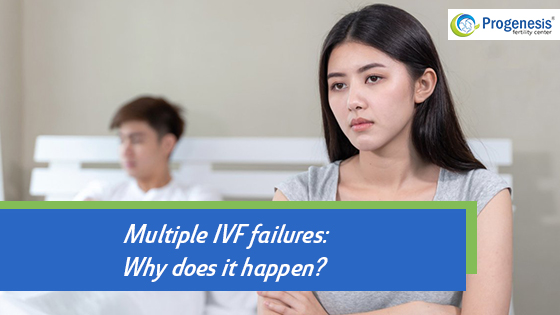While you have heard many success stories about in-vitro fertilization (IVF), you might wonder why IVF fails in some cases? Why is it not often that we hear about failed IVF?
Usually, this is because it is a sensitive and emotional subject for couples aspiring to be parents.
On the other hand, it is also true that technology cannot promise a 100% guaranteed success; some couples seeking IVF treatment might face failure in their first cycle and require multiple cycles to get a positive outcome.
Dr. Malgoankar believes that “ The most important thing in IVF failure is, in-depth evaluation of the couple as a unit, after which we need to treat the individual factors which will help get a very good result in couples with multiple IVF failures.”
A failed IVF cycle depends on a variety of reasons, right from the clinic you choose to the lab factors and the procedure – everything is interrelated.
The other factors responsible are – a healthy egg, healthy functioning sperm, and a uterus capable of nurturing the growth of a baby.
Unfortunately, in some cases of multiple IVF failures, risk factors such as age, lifestyle, and high-stress levels are the ultimate cause of failures.
It’s normal to grieve for this loss, but try not to blame yourself or your partner. Many times, the chances are, the failure is not due to anything you could control.
The reasons for multiple IVF failures vary in every individual and so do the treatments.
Below are some common causes of repeated IVF failures that can help you get a clear idea about the subject:
Common Causes of Multiple IVF Failure
1. Embryo Implantation Failure
The inability of the embryo to attach to the uterine lining is one of the most common causes of repeated IVF failure. It makes it difficult to determine whether an embryonic deformity or uterine problem is deterring the success of an IVF procedure.
In some cases, a healthy embryo is susceptible to perinatal death after being transported to the uterus. Sometimes chromosomal and genetic abnormalities can make the embryos too weak for the IVF procedure.
2. Poor egg quality
Women under the age of 35 have a higher success rate with embryo implantation, whereas the success rate drops in women over the age of 40.
As you age, the egg quality declines and may not be fit for conceiving, which could be the underlying reason for IVF failure. In this case, if the uterus is healthy, then resorting to donor eggs will likely bring you more success.
3. Chromosomal Abnormalities
Chromosomal abnormalities in the embryo are one of the most common causes of IVF failure. This holds true for all human embryos, whether they are naturally conceived or developed in an embryology lab.
These abnormalities are often the reason behind most miscarriages and failed IVF cycles. As a woman approaches her 30s, the likelihood of chromosomal abnormalities in her eggs increases.
As a man gets older, his sperm accumulates more chromosomal defects, but at a much slower rate than a woman’s eggs.
If you are suffering from multiple IVF failures, your fertility doctor may suggest PGS (preimplantation genetic screening) for your future IVF cycle.
The screening aids in the detection of any potential chromosomal abnormalities throughout the embryonic period.
4. Ovarian Response and Female Age
Age, uterine health, and the body’s response to IVF medications play a crucial role in determining the success of IVF.
Egg production from the ovary declines sharply after the age of 30, hence before commencing with the IVF procedure, your fertility specialist might recommend some medicines to enhance the production of eggs.
Although the body’s response to these medications varies for every individual, they help in increasing the egg quantity in women with advanced age, thus increasing the chances of IVF success.
5. Poor sperm Quality
Health, motility, and the number of sperms play an important role in the process of fertilization. Eggs and sperm have receptors on their surface that facilitate the fertilization process.
Normally during fertilization, some special enzymes are released from the sperm’s head that create a hole in the egg’s outer membrane allowing the sperm to penetrate.
In case of abnormal or poor quality sperm, this process might get complicated, making it harder to conceive naturally and artificially
IVF failures are more likely when the sperm quality declines, this may be due to age, lifestyle, obesity, psychological stress, etc.
Conclusion
The causes of IVF failure vary in each individual, and most of them are often difficult to diagnose.
Age, sperm quality, egg health, uterine state, and other factors are all significant causes of IVF failure. Hence, it is important to formulate a treatment plan that will address the underlying problems and leverage the chances of success.
According to Dr. Narhari Malgoankar, “The success of your IVF is largely determined by the IVF centre you choose, the technology used by your doctor, your consulting fertility expert, the team of physicians at your service, and the in-house embryology team. Everything can make a difference.”
We understand that IVF failure is a hard thing to deal with, but despondency or despair is not going to help in either way.
Suffering from infertility? We can help you! One of the exponentially growing IVF brands, Progenesis, provides the best IVF treatment in India.
Get in touch with our expert specialists today!

